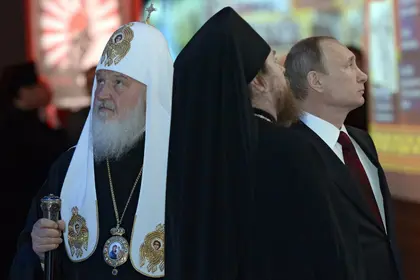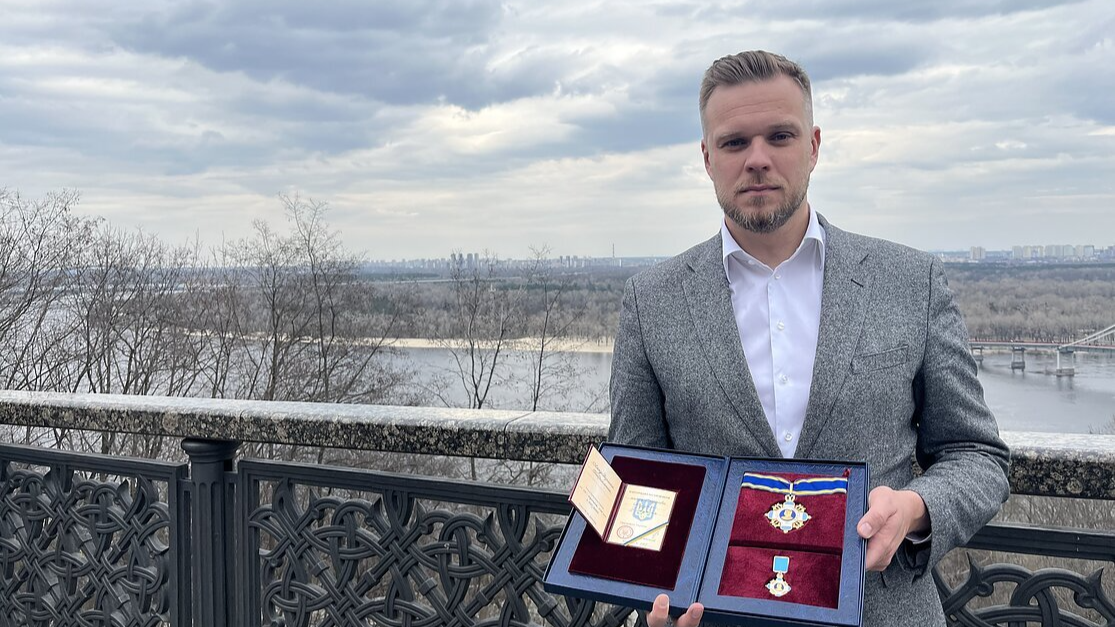Overview:
- Russian bombs knock out power in Kherson
- AFU troops make small gains south of Bakhmut
- Kremlin sends Putin’s personal confessor to occupied Crimea
- Putin’s Avdiivka bid still unsuccessful, but takes to TV to laud troops there
- Commanders on the ground continue to complain about Moscow decision-makers
- Ukraine steps up the pressure in western Zaporizhzhia
- Madonna includes Ukrainian flag segment in concert tour
Guided bombs strike Kherson
The head of the Kherson City Military Administration, Roman Mrochko, said on Sunday that Russian aircraft dropped two bombs on the city, knocking out the power.
“About an hour ago, within 30 minutes, a Russian Su-34 dropped what’s believed to be two precision-guided bombs in the area of a critical infrastructure facility in Kherson,” Mrochko posted on Telegram.
JOIN US ON TELEGRAM
Follow our coverage of the war on the @Kyivpost_official.
“A powerful explosion rang out in Kherson. Immediately after that, the electricity went out in some districts of the city, and there are water supply interruptions,” he said.
Putin praises Russian campaign in Avdiivka
Russian President Vladimir Putin on Sunday applauded the supposed gains of his troops, including the hotly contested industrial town of Avdiivka, which the Russians have tried unsuccessfully for days to encircle.
“Our troops are improving their position in almost all of this area, which is quite vast,” he said in an interview on Russian television, AFP reported. “This concerns the areas of Kupiansk, Zaporizhzhia and Avdiivka.”
AFP pointed out that “several analysts, using open source images of the assault on Avdiivka posted on social networks, have noted the Russians appear to suffering major losses of military materiel.”
Russian forces now control territory to the east, north and south of the village and are trying to push Ukrainian forces further from Moscow-held Donetsk, only about 15 kilometers away.

How the Vatican Appeases Putin’s Orthodox Auxiliaries
Operations: Avdiivka
Ukrainian and Russian sources stated on Sunday that Russian forces did not achieve the immediate breakthrough that had looked likely, and that Russian forces faced high losses and mounted slower-than-anticipated progress.
The General Staff of Ukraine’s Armed Forces (AFU) reported on Sunday that fighting occurred near six settlements, while Ukrainian Tavriisk Group of Forces Spokesperson Colonel Oleksandr Shtupun noted over the weekend that Russian forces have lost more than 300 pieces of military equipment and 3,000 soldiers since intensifying offensive operations in the Avdiivka area a week ago.
Observers on the ground have reported that Russia has been building its forces on the Avdiivka-Donetsk City front, including 15 motorized rifle regiments and 11 rifle regiments, and have “already executed regiment-size offensive operations in the area (meaning three or more battalions conducting cohesive assaults), a scale beyond that of most Russian or Ukrainian attacks at this stage in the war,” the Institute for the Study of War (ISW) reported.
“This reported Russian grouping will likely be able to sustain offensive operations aimed at encircling Avdiivka if Russian commanders are willing to sustain relatively high losses, despite being insufficient for an immediate breakthrough,” the ISW analysts predicted.
After days of intense combat in Avdiivka, I've decided to make a preliminary analysis of the ongoing events. I'm looking at the bigger picture, aiming to spot key patterns and notable signs that can help us understand the situation better. This analysis will cover both the… pic.twitter.com/jXmGblcbMZ
— Tatarigami_UA (@Tatarigami_UA) October 14, 2023
Operations: Zaporizhzhia and Bakhmut fronts
Ukrainian forces have made slight advances south of Bakhmut and turned up the pressure in the western Zaporizhzhia region, ISW reported.
Footage posted to X on Sunday indicates that AFU troops have made small territorial gains towards the railway line north of Klishchiivka (7 km southwest of Bakhmut). Russian sources also reported continued Ukrainian ground attacks on the Klishchiivka-Kurdyumivka-Andriivka line (7-13 km southwest of Bakhmut).
One reliable observer, ISW reported, stated that Ukrainian forces took advantage of recent Russian counterattacks in western Zaporizhzhia to advance near Kopani (5 km northwest of Robotyne), east of Nesteryanka (10 km northwest of Robotyne), and near Verbove (18 km southeast of Orikhiv). Kyiv has yet to weigh in officially on those claims, but even Russian sources on Sunday reported stepped-up Ukrainian attacks on the Robotyne-Novoprokopivka-Verbove line.
Russian commander complains of poor competency and dwindling supplies
Russian Battalion Commander Alexander Khodakovsky, who had complained in the past about how higher-ups have hindered Russian forces’ ability to fight effectively, posted on Sunday that Russian infantry on the front in Ukraine continues to face insufficient counterbattery capabilities, problems with “commander competency,” medical support, and rotations.
He claimed that lack of communication between Russian battalions and Moscow-controlled command is so common that when Ukrainian forces struck a Russian headquarters building, a battalion in the field did not realize that their headquarters had been destroyed.
Other Russian military bloggers complained of ammunition shortages and continued issues combating Ukrainian drones. A sense of disdain for the Kremlin’s command was a pervasive thread, ISW noted, and Khodakovsky was quite direct in his criticism:
“The higher the decision-making echelon, the less those decision-makers are interested in what problems arise at the battalion level,” Khodakovsky wrote. “When you bring your ideas to a person who can influence something, you observe a noticeable decrease in interest as the idea is presented.”
The main needs of his infantry, he said, are counterbattery capabilities, then “commander competencies and approaches,” then medical support, then soldier rotations, supplies, and “organization of everyday life.”
Putin’s priest sent to keep an eye (and ear) on Crimea
Russian opposition paper Meduza reported on Sunday that the Russian Orthodox Church (ROC) “is sending a reportedly closely Kremlin-affiliated priest to Crimea, likely as part of continued Russian efforts to persecute religious communities in occupied Ukraine,” the ISW pointed out.
Meduza reported that the Synod of the Russian Orthodox Church appointed Pskov Metropolitan Tikhon (Georgii Shevkunov) as the head of the Crimean Metropolitanate.
Shevkunov is allegedly Putin’s personal confessor and reportedly has close ties with Russian government officials.
ISW previously reported that “Russian authorities are reportedly installing ROC representatives in independent Orthodox of the Church of Ukraine (OCU) communities in occupied Ukraine in order to collect information on non-ROC parishioners and clergy members and provide information to Russian special services. ISW has long assessed that Russian authorities have conducted systemic religious persecution against OCU dioceses and religious minorities in occupied Ukraine since the start of the war.”
In his farewell speech to his flock, the Metropolitan described how, in Byzantine times, Crimea was a famously desolate hinterland where “nobody lived.”
“What was Crimea in Ancient Greece, in Byzantium? Kolyma! This is Kolyma! For us this is Crimea, but for them it was a place where people did not live normally... So I’m going to the resorts of Kolyma,” he said at the Pskov-Pechersk Monastery.
Madonna wraps herself in Ukrainian flag on tour
At a time when Western audiences seem to be shifting their attention to the conflict in the Middle East, pop legend Madonna reminded her London audience over the weekend about the horrors of Russia’s invasion of Ukraine.
Kicking off a world tour over the weekend, and featuring a hat by Ukrainian designer Ruslan Baginskiy, the 65-year-old diva draped herself in the Ukrainian flag and held a quick tribute to the partisans in the middle of a performance of “Don’t Cry For Me, Argentina.”
You can also highlight the text and press Ctrl + Enter









